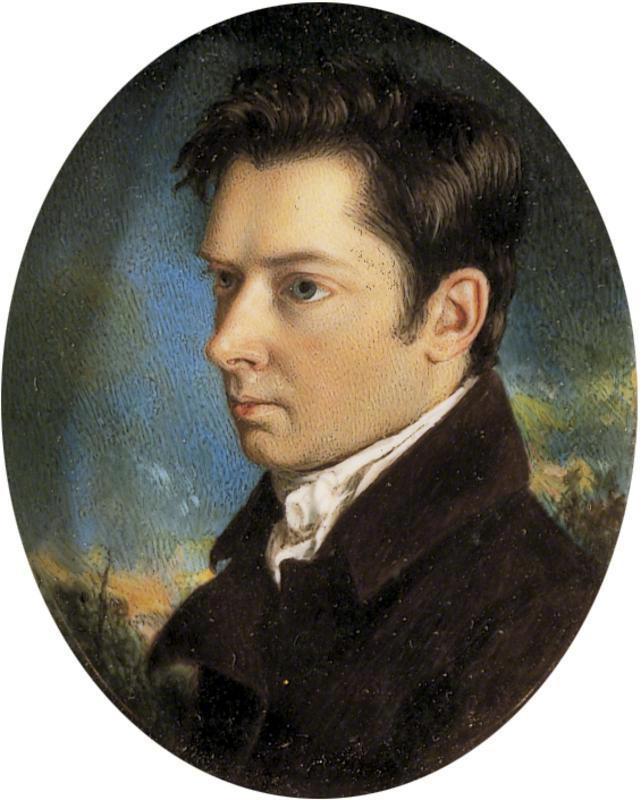William Hazlitt Berühmte Zitate
„Es ist besser, weder lesen noch schreiben zu können, als weiter nichts zu können.“
Table Talk, 1821 - 1822
William Hazlitt: Zitate auf Englisch
"On the Character of Cobbett"
Table Talk: Essays On Men And Manners http://www.blupete.com/Literature/Essays/TableHazIV.htm (1821-1822)
“Good temper is one of the great preservers of the features.”
This is from Hazlitt's "Conversations of James Northcote, Esq., R.A.," New Monthly Magazine (1826-1827), published in book form in 1830; but the words were spoken by Northcote
Misattributed
"On Cant and Hypocrisy"
Men and Manners: Sketches and Essays (1852)
"On Living to One's-Self"
Table Talk: Essays On Men And Manners http://www.blupete.com/Literature/Essays/TableHazIV.htm (1821-1822)
"On Application to Study"
The Plain Speaker (1826)
"On the Look of a Gentleman"
The Plain Speaker (1826)
"American Literature — Dr. Channing," Edinburgh Review, (October 1829), reprinted in The Collected Works of William Hazlitt (1902-1904)
"On the Spirit of Obligations"
The Plain Speaker (1826)
“Zeal will do more than knowledge.”
" On the Difference Between Writing and Speaking http://www.blupete.com/Literature/Essays/Hazlitt/DiffWritSpeak.htm"
The Plain Speaker (1826)
"Why Distant Objects Please"
Table Talk: Essays On Men And Manners http://www.blupete.com/Literature/Essays/TableHazIV.htm (1821-1822)
"On the Ignorance of the Learned"
Table Talk: Essays On Men And Manners http://www.blupete.com/Literature/Essays/TableHazIV.htm (1821-1822)
"On Going on a Journey"
Table Talk: Essays On Men And Manners http://www.blupete.com/Literature/Essays/TableHazIV.htm (1821-1822)
"The Modern Gradus ad Parnassum," London Weekly Review (17 May 1828), reprinted in New Writings by William Hazlitt (1925), edited by P. P. Howe
No. 156
Characteristics, in the manner of Rochefoucauld's Maxims (1823)
"On Knowledge of the World"
Men and Manners: Sketches and Essays (1852)
"On Prejudice"
Men and Manners: Sketches and Essays (1852)
"On Milton's Sonnets"
Table Talk: Essays On Men And Manners http://www.blupete.com/Literature/Essays/TableHazIV.htm (1821-1822)
"On Criticism"
Table Talk: Essays On Men And Manners http://www.blupete.com/Literature/Essays/TableHazIV.htm (1821-1822)
" On Cant and Hypocrisy http://www.blupete.com/Literature/Essays/Hazlitt/CantHypocrisy.htm", London Weekly Review, (6 December 1828)
Men and Manners: Sketches and Essays (1852)
No. 429
Characteristics, in the manner of Rochefoucauld's Maxims (1823)
“Wit is the salt of conversation, not the food.”
"On Wit and Humour"
Lectures on the English Comic Writers (1819)
"On Thought and Action" http://books.google.com/books?id=9NU3AAAAYAAJ&q=%22The+great+requisite%22+%22for+the+prosperous+management+of+ordinary+business+is+the+want+of+imagination%22&pg=PA241#v=onepage
Table Talk: Essays On Men And Manners http://www.blupete.com/Literature/Essays/TableHazIV.htm (1821-1822)
"On Going on a Journey"
Table Talk: Essays On Men And Manners http://www.blupete.com/Literature/Essays/TableHazIV.htm (1821-1822)
“Cunning is the art of concealing our own defects, and discovering other people's weaknesses.”
No. 101
Characteristics, in the manner of Rochefoucauld's Maxims (1823)
"On the Feeling of Immortality in Youth"
Table Talk: Essays On Men And Manners http://www.blupete.com/Literature/Essays/TableHazIV.htm (1821-1822)
“Violent antipathies are always suspicious, and betray a secret affinity.”
"On Vulgarity and Affectation" http://books.google.com/books?id=gykJAAAAQAAJ&q=%22Violent+antipathies+are+always+suspicious+and+betray+a+secret+affinity%22&pg=PA377#v=onepage
Table Talk: Essays On Men And Manners http://www.blupete.com/Literature/Essays/TableHazIV.htm (1821-1822)
"On the Past and Future"
Table Talk: Essays On Men And Manners http://www.blupete.com/Literature/Essays/TableHazIV.htm (1821-1822)
"A Farewell to Essay-Writing" (March 1828)
Winterslow: Essays and Characters (1850)
"On Vulgarity and Affectation"
Table Talk: Essays On Men And Manners http://www.blupete.com/Literature/Essays/TableHazIV.htm (1821-1822)
"On People With One Idea"
Table Talk: Essays On Men And Manners http://www.blupete.com/Literature/Essays/TableHazIV.htm (1821-1822)
